Outside the gates of St Jude’s stands a crowd of people.Today is Selection Day for Standard 7 students who are vying to enter St Jude’s in Form 1, the start of secondary school.
When St Jude’s was just beginning, there was no gate. On Selection Day, students would breeze onto the school grounds, milling around chatting and using the swings on the playground.
Today it’s a different story. Inside the gates, looking out, is Deputy Director, Angela.
“It used to be that when we invited students to sit the exam, we would ask them to bring two friends, because the hardest thing was getting the word out there to the right areas to build up the number of students we had,” she says.
Those days are long gone, as the reputation of St Jude’s has grown along with the knowledge that this is a unique chance to secure a free, quality education.
With the opening of St Jude’s Girls Secondary School in January, demand is even higher.
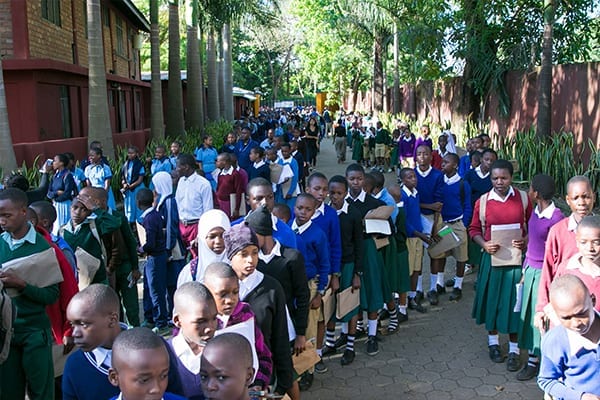
This year, just over 1,300 girls and boys were invited and ultimately, there will only be space for around 80 new additions joining the current St Jude’s students moving up to secondary school – 20 new boys and 60 new girls.
For the first time ever, St Jude’s has extended the invitation to all seven districts in Arusha, in what is a rigorous application process. There’s only 25 desks and chairs in the Form 1 classrooms, but they could be filled many times over if enthusiasm was the only criteria.
The waiting teenagers are standing side-by-side, 20 wide, and snaking all the way back down the dirt road outside St Jude’s.
They begin filing in, former St Jude’s primary students on the left, and high-performing students from government schools in the Arusha region on the right.
Standing in the middle is Acting Academic Manager, Nzinyangwa Mcharo.
“There is no favouritism,” says Mr Mcharo. “Today everyone is the same.”
All of the students, including those who were enrolled at St Jude’s primary school, will sit three exams throughout the day, with the brightest passing to the next stage, the all important poverty assessment.
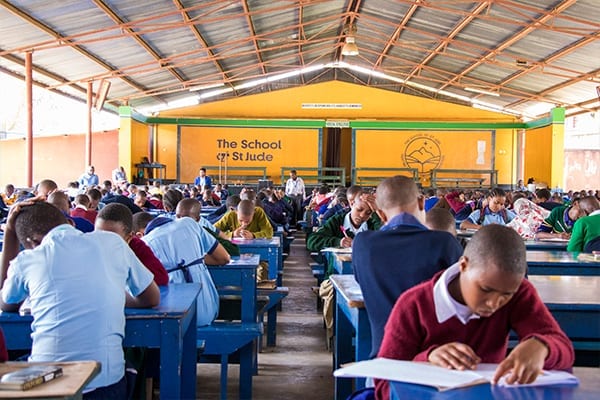
St Jude’s graduate, Noah is currently working with the Supporter Relations team as part of his Beyond St Jude’s Community Service Year. He can still remember his first Selection Day 13 years ago.
“Everyone in Arusha wants the chance to be a St Jude’s student,” says Noah. “After I passed I felt proud and my parents were very happy - even happier than me I think!”
Noah, who is now 22-years-old, says that if he didn’t have the chance to go to St Jude’s he would be a different person. The school gave him not just an education, it also taught him the values of respect, honesty, responsibility and kindness.
Today, Noah is ushering students from the gates, towards the registration lines. In the afternoon he will be taking photos of the successful applicants for their student profiles.
A lot of the students are understandably nervous; this is a massive opportunity. Noah knows how they feel and provides a comforting presence.
“I can remember standing outside the gates,” says Noah. “I just wanted to get in there and do the exams.”
Noah isn’t the only St Jude’s graduate helping out today, with other former students from the Community Service Year program also volunteering their time.
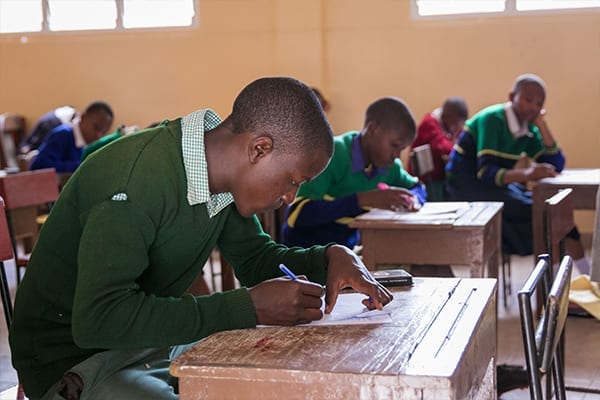
In total over 100 staff, parent representatives, and St Jude’s graduates are helping out on one of the biggest days of the year.
The students sitting the exams have been siphoned off into classrooms spread throughout three different buildings – it’s a complex logistical exercise to make sure everyone invited to the exams is treated fairly.
One frazzled boy, arrives late having travelled from Singida, over 300 kilometres away – a journey that took five hours. Despite looking weary from his trip, he is eager to start the exam as soon as he can, grateful to still have his chance at securing a place.
Not to worry though, School Founder, Gemma Sisia’s 7-year-old daughter, Louisa, is at hand and offers to accompany him to a classroom.
“It’s really good to see everyone pull together,” says Gemma, standing next to her daughter, as she looks across the students sitting the exam in the assembly hall. “I wonder which ones will make it all the way through and be the Community Service Year interns giving directions or taking photos in 7 years.”
With even more new students starting in January, more bright, poor students will be getting the education they deserve. Support a students’ academic scholarship today.
Lina can still remember student selection day in late 2006, when she was first told she’d got into St Jude’s.
“It was the happiest day of my life,” says Lina. “I will never forget it.” Now 20-years-old, Lina has been doing her Community Service Year internship at Moivaro Boarding Campus, giving back to the boarding house she called home for four years.
For Lina, Moivaro is still the same as she remembers. The smell of the food, the sound of students preparing for a day at school and the building that became her home.
Now, the boarding campus has become Lina’s second home once again, after choosing to spend her Community Service Year as a St Jude’s boarding parent. The Community Service Program is a way for graduates to give back to St Jude’s and the community in the spirit they received and ‘pay forward’ to those following in their footsteps.
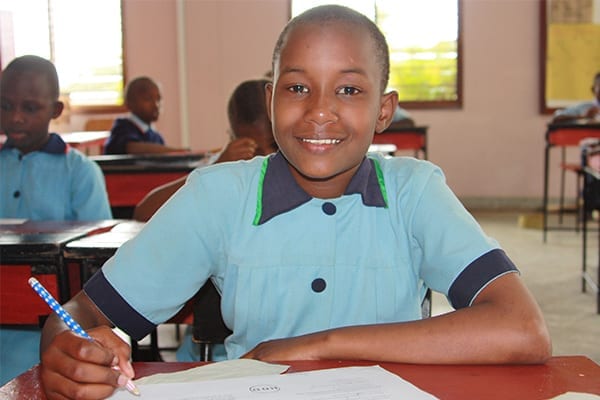
“The biggest thing I have learnt at St Jude’s is the importance of volunteering,” says Lina. “Because I had someone who gave so much to help me and sponsor my scholarship.”
For 12 months Lina will look after the wellbeing of St Jude’s primary students from Standard 5 to Standard7; fostering their life skills and providing valuable advice on study techniques.
“I have been volunteering on my own initiative outside of school since Form 4, teaching a few classes in government schools in my area and helping adults to improve their English,” says Lina. “I’m looking forward to being around St Jude’s students who are in the same situation that I once was.”
It’s been a whirlwind year since Lina graduated from Form 6 in May.
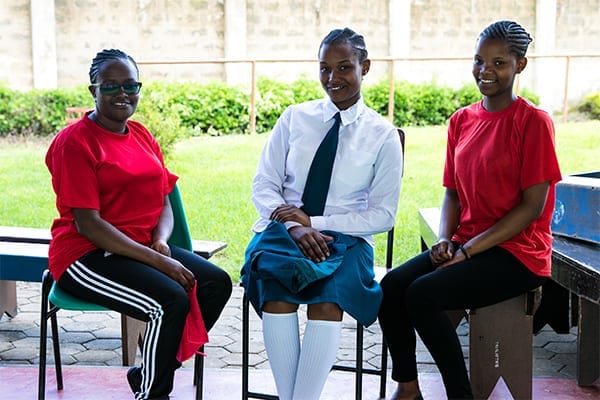
“Finishing exams and secondary school is a breakthrough in my life,” says Lina. “I cried singing our school song on Graduation Day - I was the first person in my family to graduate from secondary school.”
Lina’s education at St Jude’s has also had a big impact on her family, with her parents saving the money they would have spent on her education to afford an upgrade from their rented one-roomed structure built from mud, to a three-bedroomed brick home in a higher social-economic area just outside of Arusha city.
“My education has motivated my mum and dad to work harder,” says Lina. “I remember we sometimes didn’t have meals during my childhood as my father was unemployed, but they are in a much better situation now.”
On average, Tanzanian girls from a poor rural background, will only receive 3.7 years of schooling.For Lina, most of her childhood friends are married with children, while she feels that she is now free to determine her own future.
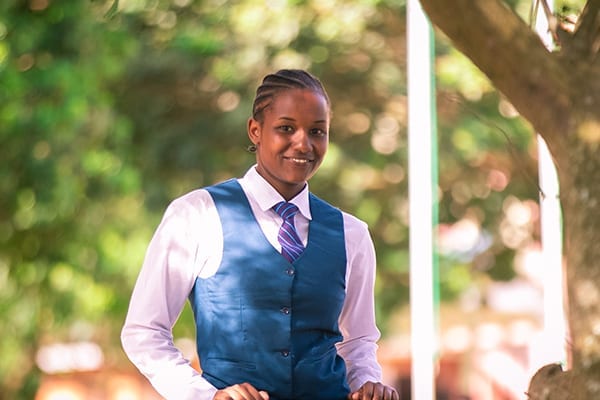
“I am treated better than other girls in my community because I am educated,” says Lina. “I am proud to be an educated woman.”
But the hard work, doesn’t stop there. On completion of her Community Service Year, Lina will continue being supported by the Beyond St Jude’s program in her first higher education qualification.
Lina hopes to study Community Development at university, with dreams to one day start her own not-for-profit organisation. In the meantime, she will be supporting students on the same journey that has helped her get to where she is today.
Help a young adult like Lina take the next step in their career and give back to the community after graduating. Contact our Beyond St Jude’s team at info@schoolofstjude.co.tz and find out how you can support one of our graduates.
Grace is sitting in the back of a St Jude’s shuttle bus, tumbling across the flats of Arusha, towards Smith Secondary Campus. To her left looms Mount Meru, it’s summit shrouded in cloud.Since 2008, Grace, who is visiting from Scotland, has been sponsoring the scholarship of a Form 5 girl by the name of Rahima. Today, she will meet Rahima for the first time.
“I’m excited,” says Grace, whose eyes remain fixed on the Arushan landscape. “We’ve been exchanging letters for eleven years.”
Grace lives in Shetland, an island off the north coast of Scotland. Her distinguished career in theatre has included being associate director of the acclaimed ‘War Horse’ production, when it toured Australia.
“Directing is about interpreting a story, and providing depth to that story,” says Grace.
The story she sees in Tanzania is the effect education can have on a community.
“Education can change not just one person’s life,” she says. “But also the lives of their family, even their community.”
On arriving at Smith Secondary Campus, Grace walks across the green lawns, and inside the Visitor Centre, waiting for Rahima.
“It’s like a university,” she says, looking outside, at the surrounding buildings with students teeming up and down the long, winding staircases.
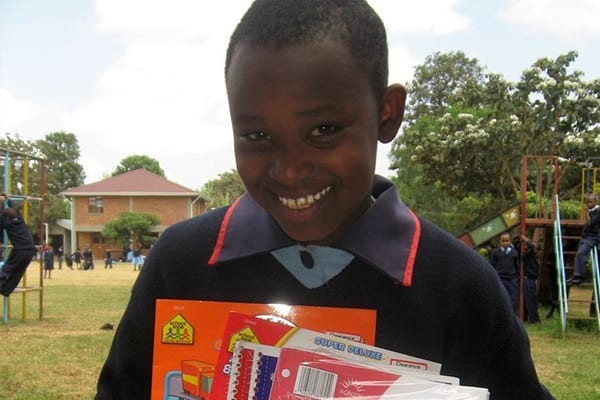
After a short while, Rahima walks into the room, visibly excited to see Grace for the first time.
“I remember when you were little,” says Grace, looking disbelievingly at 19-year-old Rahima. “You would send me drawings of rainbows with stickers.”
The two leave the room, side by side. Outside, a group of Rahima’s friends are waving excitedly.
“They are happy for me that I am meeting my sponsor,” says Rahima, with a smile.
Together, Rahima and Grace, with a teacher accompanying them, hop into the school bus as it takes off towards a remote suburb called Olasiti, where Rahima’s mother lives. The drive will take an hour and a half - this doesn’t bother the pair though as they begin to talk in earnest.
Rahima chats about her favourite writer, Adam Shafi Adam, while Grace shows pictures of Scotland on her phone.
Grace can’t stop looking at Rahima, seemingly mesmerised by the fact that the girl she has been sending letters to since the age of seven is now sitting next to her, on the cusp of womanhood.
As the bus moves closer to Olasiti, the roads shift from asphalt to dirt. Fields of maize and beans extend as far as the eye can see. As the bus bounces over rocks and dodges potholes, it becomes hard to maintain conversation.
Rather than sit in silence, Grace and Rahima begin singing songs together, over the racket of the road.
Eventually, the bus turns left down a street filled with playing children and dust covered dwellings.
Out steps a woman from behind a rusted tin fence, bearing a big smile and wearing a long grey dress littered with blue polka dots.
The woman’s name is Margaret, and she is Rahima’s mother.
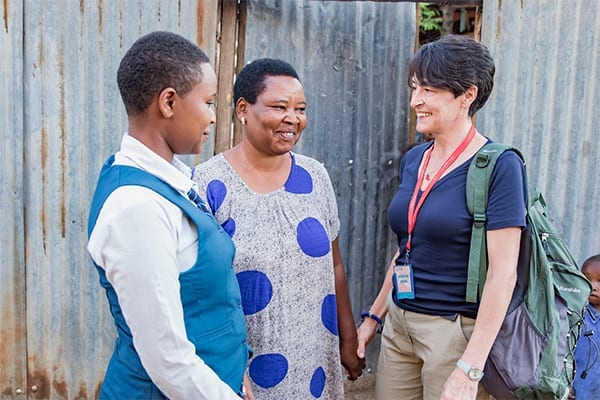
When Rahima and her brother were young, their father walked out on them. He took all their belongings with him.
Margaret didn’t have a job at the time – she was left with no furniture, and no money. A friend of hers, a woman from the neighbourhood, heard about Margaret’s predicament and decided to pay the bills.
Eventually, Margaret got a job as a housekeeper, slowly piecing her life back together, before her life took another turn – this time for the better.
One day, Margaret was at the market when an announcement was made about a school named St Jude’s that was accepting applications. On a whim, Margaret decided to have her daughter sit the exam, joining thousands of other applicants from around Arusha.
In August of 2007, Margaret was visited by St Jude’s – her seven-year-old daughter had got a place.
Now, Margaret is proudly welcoming her guest into her home – filled with the furniture she bought, and the daughter she raised.
Inside the one-room house, everything is blue – the couches, the walls, even the curtains.
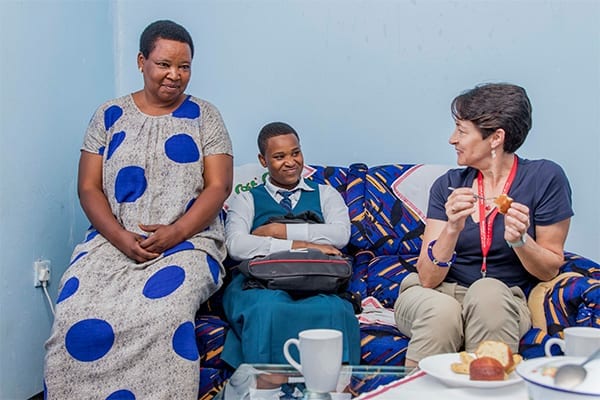
Margaret presents Grace with a bright red ‘kikoi’, a traditional African woven cloth, to say thank you for sponsoring her daughter’s education.
“In Scotland, I will put this on my wall,” says a grateful Grace.
“Come back again,” says Margaret. “And I will get you another one.”
The two women begin to talk about Rahima, and her bright future.
“She will be a minister in our government,” says Margaret, absent mindedly stroking her daughter’s shoulder. “Maybe even the President!”
“I want to be a lawyer,” laughs Rahima.
“What would you do if you were President?” asks Grace.
“I would change everything,” jokes Rahima.
The three women step outside to take photos. The summit of Mount Meru is now clear, its contours rippling in a brilliant blend of orange and yellow, that can only be found during an African sunset.
Standing on the front step of the house, Grace and Margaret grin at the St Jude’s photographer, Onesmo, while Rahima is filled with teenage embarrassment from all the attention.
“Smile, Madam President!” says Onesmo, capturing the moment.
Share in the growth of one of our students and see them flourish. Sponsor an academic scholarship today.
Every year, in October, the entirety of the school gathers together to celebrate St Jude’s Day. It’s a chance for students, teachers and special guests to gather as a community and celebrate the school’s culture, with the focus being on giving and giving thanks.2,000 attendees are packed into the Sisia Primary Campus assembly hall, surrounded by make-shift pavilions holding the large student body and some of their families.
In the middle of the service of thanks, a snaking line of students ceremonially march through the centre of the assembly hall to the front stage carrying baskets filled with small toys, food, cleaning materials and much more. Small gifts, donated by students, their families and staff to go to those in even greater need.
One of the people watching in the crowd is Irene, a former student and current Community Service Year intern in the Visitor team.
“Giving is about being there for someone,” she says. “Without sponsors and donors, we wouldn’t be here – it’s all because of their giving.”
The act of giving is the cornerstone of St Jude’s culture and an important principle in creating strong moral leaders for the Tanzania of tomorrow.
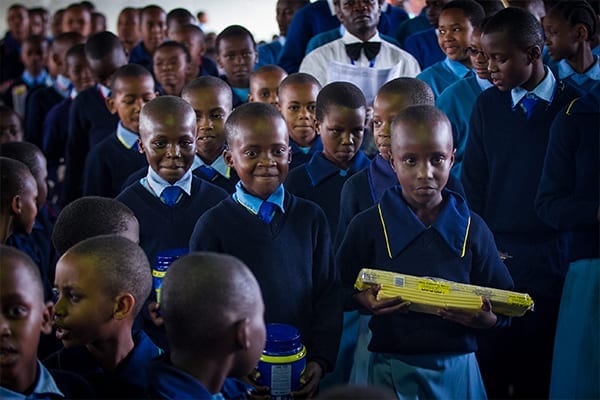
“The culture at this school starts with giving to others,” says Reginald Mongi, who is the Deputy Welfare Coordinator. “This is what we learn.”
Another audience member is Parent’s Committee Representative, Elizabeth. Her daughter, Nice, is in Form 1 and she has been at St Jude’s since 2012. Nice has two older brothers and two younger sisters.
“St Jude’s has helped me by educating my child,” she says. “This means I am able to use the money I’ve saved to help my other children go to school.”
Last Saturday, the gifts were presented in person by three groups of students, to nine orphanages in the Arusha region.
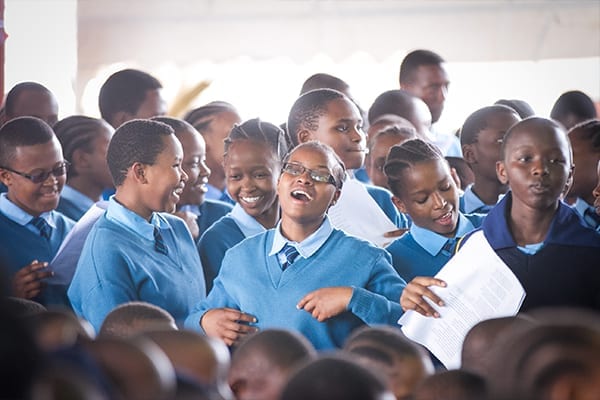
One of the orphanages supports babies who are two years old and younger. St Jude’s students, including Standard 7 girl Sal, delivered three baskets filled with gifts to the babies, and spent time playing with them and their new toys.
“It’s important not to be selfish,” says Sal. “If you have something, you should share it with others.”One of the teacher’s supervising the day, Juliette, sees this as an important tradition and an opportunity for the students to gain perspective.
“They shouldn’t think that they’re from the only disadvantaged families,” says Juliette, who teaches English. “There are so many others out there also in need, they should be thankful.”
Throughout the day, Juliette’s group of students visited three different orphanages. The last of these was so excited to see the St Jude’s students that they formed a guard of honour at the gates, as the St Jude’s yellow school bus entered.
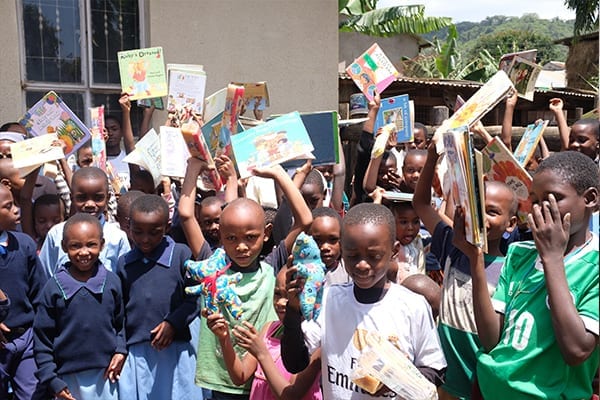
As the students exit the bus, they hand out a few teddy bears and second hand picture books.
Once all the gifts have been received, the St Jude’s students beckon the children to pose for a photo together to remember the day. The children hold up their gifts, vying for front position.
“Days like this are important,” says Elineema, a Kiswahili teacher who is supervising alongside Juliette. “We need to always instill in our hearts the act of giving.”
Sponsor a St Jude’s students’ academic scholarship to help create a leader of tomorrow.